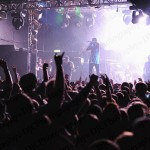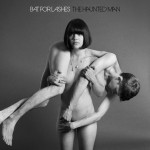Sitting high up in the Gods on the front row of the circle of this truly magnificent Victorian concert hall awaiting this evening’s show, there was just time to draw breath and reflect upon the man who will shortly be before us. Johnny Hallyday is that man and he is someone who still remains largely unknown this side of the English Channel. For those who have heard of him outside of his native country, though, and with a recording career borne of 50’s American rock and roll and which dates from 1960 he is invariably seen as either the French Elvis or the French Cliff Richard. Neither comparison is made as a compliment. It should be said, though, that they are largely British-held views informed by, you would imagine, an historic disaffiliation between the two countries and a wholly disparaging perception of all things françaises musique populaire.
However, one hundred and ten million album sales, primarily in French speaking countries, point towards his massive popularity outside of la Grande Bretagne and this is attested to by the fact that the vast majority of this evening’s audience would appear to have arrived in South Kensington courtesy of Eurostar or the cross-Channel ferry. It then comes as no surprise to learn that this is only Hallyday’s second show in this country in 52 years, his first having been the previous evening.
He takes to the stage on the stroke of nine o’clock heralded by the sonic and visual equivalent of a 21-gun salute. It is the sort of entrance you would associate with a heavy rock band populated by men half his age. Johnny Hallyday is eight months shy of 70. Dressed all in leather, with legs astride like some Western gunslinger and looking like a cross between Comeback Special Elvis and Alvin Stardust he launches straight into, appropriately enough, Allumer Le Feu. For the next two hours he is the keeper of the flame, criss-crossing various stages of his career from unreconstructed rock and roll (Eddie Cochrane’s “Something Else”), through the blues (Excuse Moi Partenaire), big booming ballads (Deux Etrangers, where he also drops down to his knees before writhing around in the spotlight as if mortally wounded by the ignominy of unrequited love), les chansons d’amour of the country of his birth (Que je t’aime and Oh Marie, both of which are fantastically overblown and ooze emotion by the pound), all the way to Hendrix’s “Hey Joe” (an homage to the man to whom he offered a support slot in Paris in 1966 and in keeping with all bar one of this evening’s songs sung in French), every single one of them showing the man’s great versatility and undoubted class.
The only song sung in English is Ben E. King’s “I Who Have Nothing”, a duet performed with one of his three female backing singers Amy Keys and which is further proof of the masculinity and muscularity of Hallyday’s voice. Undiminished by the ravages of time and recent bouts of ill health its deep throated growl adjusts itself just as easily to full-blooded rockers and les ballades populaires et ballades romantiques alike. When you harness this voix magnifique to a charismatic stage presence and an old fashioned respect and courtesy towards his audience which has been honed by over six decades of performing, you do not end up comparing him to either Elvis or Cliff. He is undoubtedly Johnny Hallyday, his own man and one worthy of his own name and his own identity.






